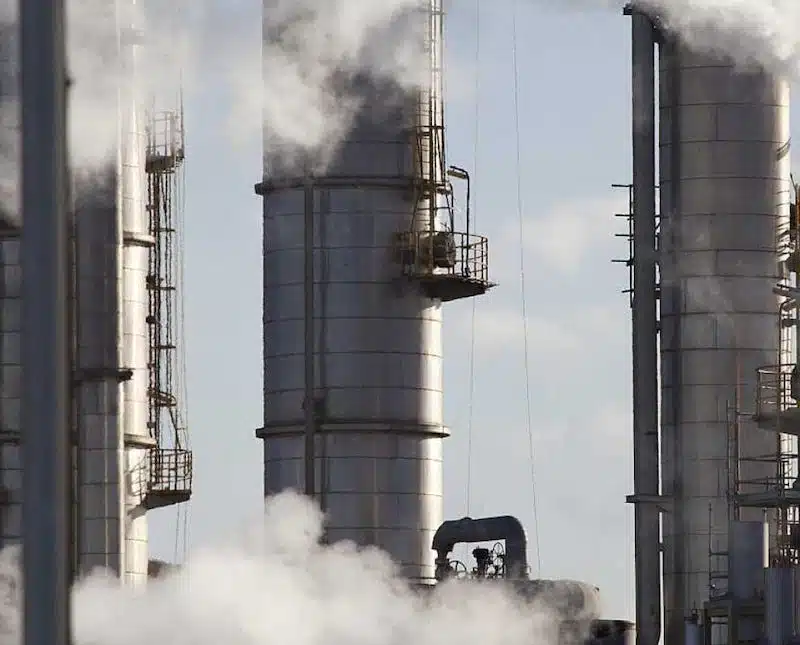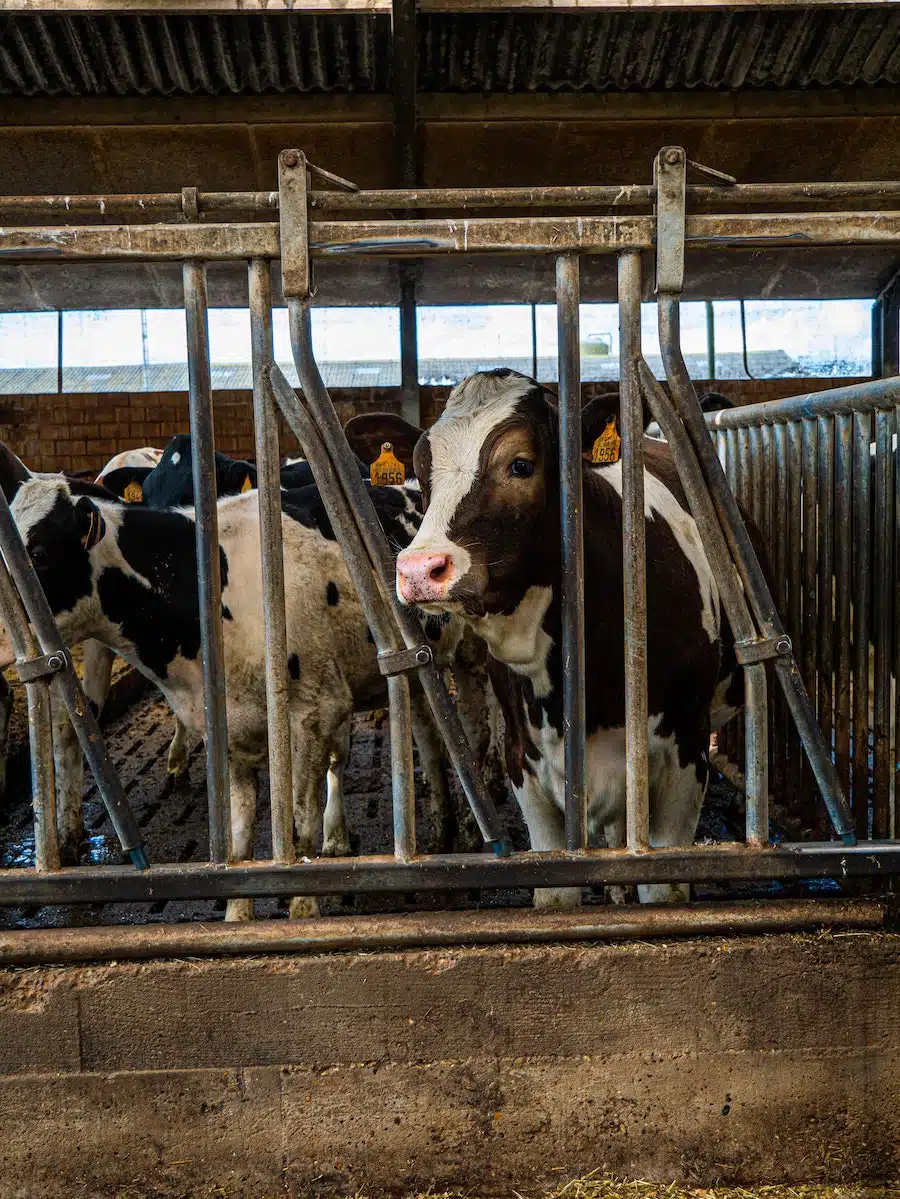Eighty percent of the ammonia manufactured globally today is used in agriculture by farmers as a nitrogen fertilizer. The world depends on ammonia fertilizer for food security. That’s why FuelPositive is focusing on farmers as our first customers.
The problem
There are two big problems with ammonia.
The first is that while we rely on it as fertilizer for food security, the traditional method of producing it, in massive centralized refineries, is one of the most emissions-intensive manufacturing processes in the world. For every metric tonne of traditional or grey ammonia produced globally, almost 3 metric tonnes of greenhouse gases are emitted.
So, production of the very product that we need for food security is contributing to climate change, which is a major threat to farming and food security! We call this the “ammonia paradox”.
It’s clear to us: Just like we need to reduce our reliance on fossil fuels because of the damage they cause to our environment, we also need to find a way to manufacture fertilizer without polluting to continue to feed a dramatically growing population.
Beyond climate change issues, disruptions to the ammonia supply chain are a common cause of stress for farmers, resulting in late deliveries, insufficient supply, and sky-rocketing prices. Today’s farmers are looking for alternatives to meaningfully contribute to a reduction in their carbon footprint along with gaining more control over their operations and expenses.

The solution

Agriculture is the first sector FuelPositive is entering. Fertilizer is single most expensive input cost for grain and oilseed crop farmers. Oilseed crops include canola and soybeans, which are both major crops across the Canadian prairies. Canola and grain production are significant consumers of anhydrous ammonia to meet nitrogen fertilizer requirements.
FuelPositive’s onsite, containerized, Green Ammonia production system is a perfect solution for decarbonizing and decentralizing the production of ammonia. The system produces Green Anhydrous Ammonia where it is needed, in the amount needed, when it is needed, at a stable price. Farmers have control for the first time!
Farms of all sizes will use FuelPositive’s in-situ production systems where there is access to sustainable electricity to independently generate their own Green Ammonia. Where sustainable electricity isn’t already available, we will advise farmers how best to set themselves up with it – whether they use hydroelectric power or wind turbines or solar panels, etc. Our initial units produce up to 300 kg/day (500 litres/day or 100 tonnes/year), which is enough to provide fertilizer to farms of about 2,000 acres. Larger farms will simply add additional systems, because the design is modular and is designed for easy scaling up.
FuelPositive’s Green Ammonia systems will ultimately give farmers nitrogen fertilizer and energy independence. Each farm will house a FuelPositive production unit, scaled according to the farm’s needs. Each system fits within three 20-foot containers. Farmers will produce sufficient Green Ammonia on site to fertilize their crops and, ultimately, power their internal combustion engines, generators and other farm equipment. They will be able to convert their propane crop-drying systems to burn Green Ammonia to realize an exceptional environmental benefit.
To learn about our Letter of Intent with Manitoba farmers Tracy and Curtis Hiebert, look here.
To learn more about FuelPositive’s onsite, containerized Green Ammonia production systems, look here: https://fuelpositive.com/green-ammonia/
To see our Sales webpage, look here: https://fuelpositive.com/sales/

Why not just use manure?

Ammonia must be handled with care to avoid damage to the environment. Farmers receive training in its safe handling and application.
However, many farmers mis-use manure, which contains ammonia that is naturally produced. For mixed-use farms (those that have livestock and crops) manure (a natural by-product of all animals) is a “free” form of fertilizer, but its production and use as fertilizer is extremely environmentally costly.
Farmers spray liquid manure on the ground, which releases gaseous ammonia into the atmosphere and creates a situation where rain and runoff move a tremendous amount of highly nitrogen-intense materials (nitrous oxides or NOx) into waterways and water tables, causing significant detrimental effect (pollution) to air and water quality.
Resting manure piles and open storage release gaseous ammonia into the atmosphere, which becomes a pollutant, particularly when the gaseous ammonia mixes with other gaseous pollutants.
In comparison to using manure as fertilizer, deep injection of Green Ammonia eliminates the emissions associated with manure. But we are doing more.
Our Next Challenge with Ammonia – Reducing Emission of Nitrous Oxides
At FuelPositive, we are well aware that there is more to do to reduce the greenhouse gases associated with ammonia. Once our carbon-free Green Ammonia is produced on the farm using a FuelPositive system, there is still the problem of nitrous oxides (NOx) and other nitrogen-related emissions. These are greenhouse gases emitted by all types of nitrogen fertilizers (organic or synthetic) – whether or not the nitrogen comes from animal manure or from manufactured ammonia produced using a carbon-free process.
Supporting best farming practices for emission reduction is critical to our ability to fulfil our cradle-to-cradle commitment. We are working with our agriculture sector advisors to identify how to use our fertilizer in the least polluting way. How can we make sure everything applied to the soil is used by the plants, with no excess chemicals leaching into the ground, the water system and the air? How do we arrive at that delicate balance? What else should we be doing?
For our part, we believe our system, of eliminating the carbon emissions associated with the production of ammonia used for fertilizer, is an ideal first step and will make a considerable difference to overall emissions. Regarding NOx emissions, we understand that current best practises of deep injection of green anhydrous ammonia provides the most efficient transfer of nitrogen into the soil, with the least impact from NOx emissions. If our anhydrous ammonia is applied correctly, we believe that our product may be the best option over other nitrogen fertilizer options.
The science around sustainable farming is still in its early days, but FuelPositive is actively taking on this issue as one of our next key challenges. We are looking for partnerships and acquisitions that will facilitate sustainable farming and we will be designing future pilot projects to work directly with scientists and farmers to continue this critical effort.
Being able to produce carbon-free Green Ammonia when and where it is needed is a major step forward. Giving control to farmers is a game changer for them and will play a key role in food security, helping farmers to farm in a truly sustainable way.
We’ve already tackled carbon dioxide. Now, we take on nitrogen emissions!
To learn about our partnership with environmental scientist Dr. Claudia Wagner-Riddle, look here: https://fuelpositive.com/fuelpositive-announces-appointment-of-environmental-scientist-dr-claudia-wagner-riddle/
Our Next Agriculture Market Opportunity
We are extremely interested in Controlled Environment Agriculture, where crops are grown under a highly conditioned, technology-based environment. The greenhouse industry is what most people think of. Another example is Indoor Vertical Farming, where plants are stacked vertically in layers, so many of the farms look like warehouses filled with large shelving units.
Because of damage caused by climate change and the precariousness of traditional farming, many food security experts believe this indoor, controlled approach will play a key role in the future. We also think our onsite Green Ammonia production systems would be ideal for providing nitrogen fertilizer, as well as some of the additional applications of our technology, including fossil fuel replacement, dehumidification, heating and cooling, as ammonia is commonly used as a refrigerant, as well as for water and system purification and sanitizing.
We believe indoor farming represents a huge global market for our company.
We have recently signed two new partnerships in this field. The first, with Lenore Newman, is the Director of the Food and Agriculture Institute at the University of the Fraser Valley. She is now our Advisor of Global Food Security. Lenore is a leading researcher, author, and past Canada Research Chair in Food Security. She researches agricultural land use policy, agricultural technology and bioengineering in the food system. With Lenore, we are working directly to identify the best demonstration pilot project partners to showcase how our technology is ideally suited to support Controlled Environment Agriculture in real-world settings around the world.
The second is a partnership with the Controlled Environment Systems Research Facility at the University of Guelph, which is often referred to as Canada’s Food University. This partnership will be led by Michael Dixon, Professor and Director of the Controlled Environment Systems Research Facility, as well as with Thomas Graham, Assistant Professor and PhytoGro Research Chair in Controlled Environment Systems. We’ll be working with them on detailed research to identify the optimal performance of our systems with various crops and growing environments.
To see our news release announcing these new partnerships, look here: https://fuelpositive.com/fuelpositive-announces-advisor-of-global-food-security-and-partnership-with-university-of-guelph/


